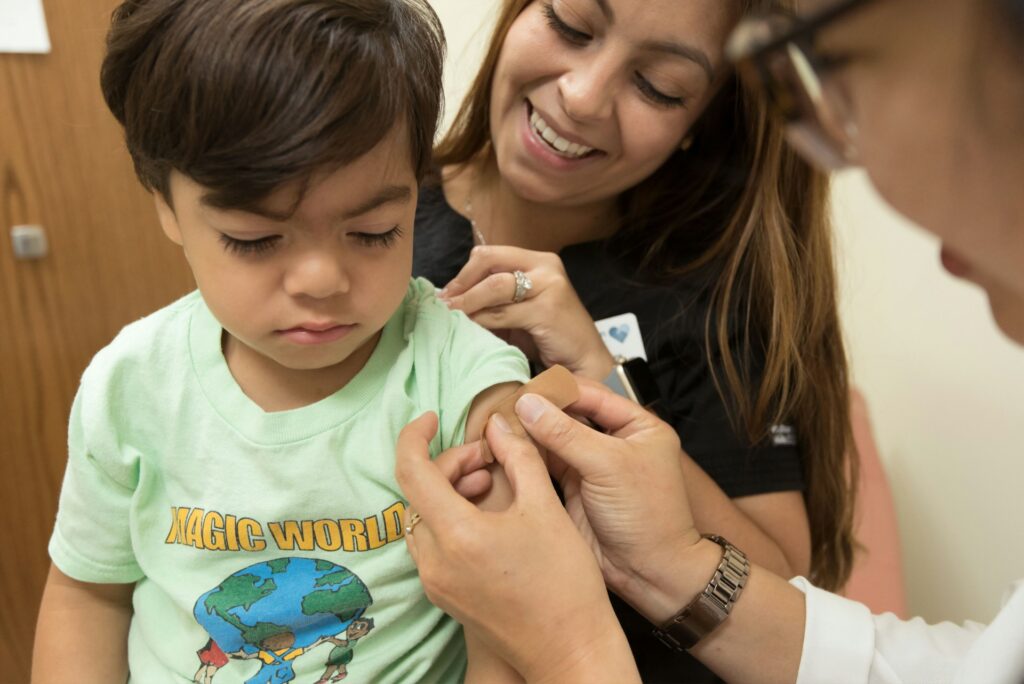Childhood vaccination is an essential preventative healthcare measure that plays a crucial role in safeguarding children against various infectious diseases. As a parent, it is your responsibility to ensure that your child receives the necessary vaccinations according to the recommended schedule. An experienced Child Specialist in Vadodara like Dr Vinit Mehta, who has over nine years of diverse experience in pediatric consultation, can be your trusted partner in understanding and navigating the complex world of childhood immunisations. In this article, we explore the importance of childhood vaccination, the recommended immunisation schedule, and address common concerns parents may have, with valuable insights from Dr Mehta.
Vaccines have been one of the most effective public health interventions, significantly reducing, and in some cases eliminating, the prevalence of many life-threatening diseases. By introducing a weakened or inactive form of a specific pathogen into the body, vaccines stimulate the immune system to produce an immune response without causing the disease. As a result, the child develops immunity to the pathogen, which protects them from potential future infections.
Adhering to the recommended vaccination schedule is essential for individual as well as overall community health. When a sufficient proportion of the population is immunised, an effect called ‘herd immunity’ occurs, limiting the spread of infections and protecting vulnerable groups that cannot be vaccinated, such as infants, pregnant women, and individuals with compromised immune systems.
Despite the proven benefits of vaccination, many parents may have concerns or misconceptions regarding vaccine safety and side effects. It is critical to address these concerns with a pediatrician like Dr Vinit Mehta in Vadodara, who can provide evidence-based information, dispel myths, and assist in making informed decisions about your child’s healthcare.
The Recommended Childhood Vaccination Schedule
A well-structured vaccination schedule ensures that children receive the necessary immunisation doses at the right ages for optimal protection. Although the vaccination schedule might vary slightly based on regional policies, the list below details the essential vaccines and their typical administration timeline:
- Birth: Bacille Calmette-Guérin (BCG) vaccine for tuberculosis protection, OPV (oral poliovirus), and Hep B1 (Hepatitis B) vaccine
- 6 weeks: DTaP (Diphtheria, Tetanus, and acellular Pertussis)/DTwP (Diphtheria, Tetanus, and whole-cell Pertussis), OPV/IPV (inactivated polio vaccine), HiB (Haemophilus influenzae type B), Hepatitis B, Rotavirus vaccine, and PCV (Pneumococcal conjugate vaccine)
- 10 weeks: Second doses of DTaP/DTwP, HiB, OPV, Hepatitis B, Rotavirus, and PCV
- 14 weeks: Third doses of DTaP/DTwP, HiB, OPV/IPV, Hepatitis B, Rotavirus, and PCV
- 6 months: OPV/IPV, Typhoid Conjugate, and Flu vaccine
- 7 months: Second dose of Flu vaccine
- 9 months: OPV/IPV, Measles and MMR (Measles, Mumps, and Rubella) vaccine
- 1 year: First doses of Hepatitis A and Japanese Encephalitis vaccines
- 13 months: Second dose of Japanese Encephalitis vaccine
- 15 months: First dose of Chicken pox vaccine and second dose of MMR vaccine
- 16 months: DTwP/DTaP Booster 1, OPV/IPV, HiB Booster, and Pneumococcal Booster
- 18 months: Second dose of Hepatitis A Vaccine and third dose of Flu vaccine
- 2 years: Meningococcal meningitis vaccine
- 2.5 years: Second dose of Typhoid vaccine, fourth dose of Flu vaccine
- 5 years: OPV/IPV, second booster of DTwP/ DTaP, second dose of MMR vaccine, and second dose of Chicken Pox vaccine
- 10 years: DTaP, HPV (Human Papillomavirus) vaccines
Please consult with your pediatrician, Dr Vinit Mehta, for the region-specific vaccination schedule and any necessary additional vaccines.
Vaccine Safety and Side Effects
A common concern for parents is the safety and potential side effects of vaccines. It is essential to know that vaccines undergo rigorous testing and stringent regulatory procedures before approval for public use. The most common side effects are generally mild and temporary, including fever, soreness or swelling at the injection site, and irritability.
Severe side effects are rare but must be reported to your child’s paediatrician immediately. Dr Vinit Mehta ensures that parents are well-informed about potential side effects and emphasises the importance of communicating any concerns or unusual symptoms promptly. In most cases, the risks associated with vaccine-preventable diseases far outweigh the minimal risks of vaccination side effects.
Addressing Parental Concerns and Misconceptions
Parents may be uncertain about vaccines due to misinformation, misconceptions, or personal beliefs. Dr Vinit Mehta is committed to engaging in open, non-judgmental conversations to address these concerns. Some common vaccine-related concerns include:
1. Vaccine ingredients: Some parents may be concerned about ingredients found in vaccines, such as thimerosal, aluminium, or formaldehyde. It is pivotal to understand that these ingredients are present in safe quantities and play a vital role in the vaccine’s efficacy or preservation.
2. Vaccine overload: The concept of vaccine overload suggests that administering multiple vaccines simultaneously can overwhelm a child’s immune system, which is incorrect. Research shows that children’s immune systems are capable of responding to several immunisations at once without adverse effects.
3. Autism link: The myth connecting vaccines, specifically the MMR vaccine, to autism persists despite numerous studies discrediting this connection. Trusted health organisations, including the World Health Organization, have repeatedly confirmed that there is no established link between vaccination and autism.
The Role of Paediatricians in Vaccine Education and Administration
Paediatricians like Dr Vinit Mehta play a crucial role in educating families about vaccine safety, efficacy, and importance. In addition to providing accurate and up-to-date information, they ensure proper vaccine administration following the recommended schedule. Dr Mehta is dedicated to answering parents’ questions and addressing concerns, building trust, and enabling families to make well-informed decisions regarding their child’s health.
Prioritising Childhood Vaccination for a Healthier Future
Protecting your child from vaccine-preventable diseases is a critical aspect of their overall healthcare. By understanding the importance of childhood vaccination and adhering to the recommended immunisation schedule, you contribute to your child’s healthy growth and wellbeing and the overall health of your community.
If you have concerns or questions related to your child’s vaccines or their overall health, do not hesitate to consult a reliable Child Specialist in Vadodara like Dr Vinit Mehta in Vadodara, who is always ready to provide the guidance and care your child needs. Contact us to schedule a growth and development assessment today.

